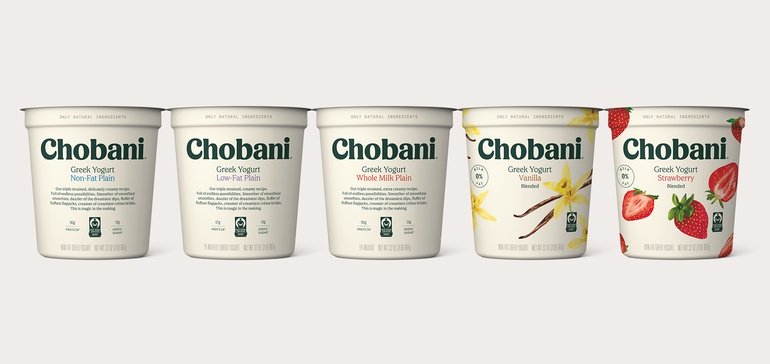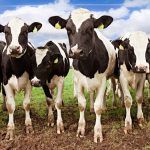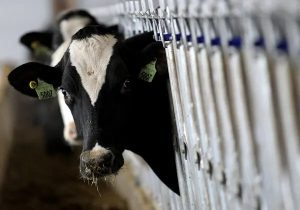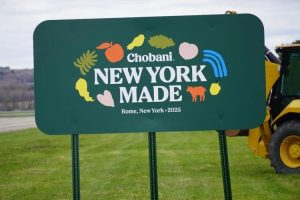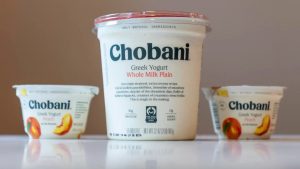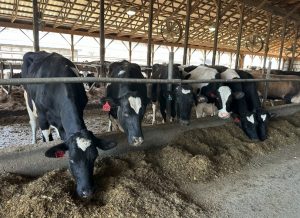
Dive Brief:
-Chobani launched Fair Trade Certified versions of all of its 32-ounce, multi-serve Greek yogurt tubs, including Whole Milk Plain, Low Fat Plain, Non-Fat Plain, Strawberry Blended and Vanilla Blended. These are the first dairy products to get the certification, the organization said.
-Chobani worked with Fair Trade USA to develop a special certification program for U.S. dairy farms and cooperatives. It grew out of Chobani’s Milk Matters campaign, launched in 2019 to determine an agricultural production standard for the dairy industry that considers product traceability, supply chain transparency, safe and non-discriminatory work conditions for employees and internal compliance systems. This standard is now available for dairy companies seeking Fair Trade certification.
-Consumers are paying more attention to brands’ stances on social, economic and environmental issues and opting for products that offer benefits beyond nutrition. Third-party certifications offer shoppers a higher level of trust and transparency compared to self-made claims, helping companies cut through the deluge of sustainability-focused marketing and branding consumers face.
Dive Insight:
Chobani founder and CEO Hamdi Ulukaya grew up on a dairy farm in Turkey and worked on a farm in New York after immigrating to the United States, so he has unique insight into the long hours and hard labor that goes into production. Adding the Fair Trade certification to some of the brand’s yogurts is his way of elevating an industry that has faced ongoing challenges, while obtaining better support for dairy workers.
“Fair Trade USA’s certification — the first-ever in the U.S. dairy industry — will help our dairy farmers build on their hard work to raise farming standards, take care of their workers, many of whom they consider family, ensure the well-being of their animals and their land, while giving consumers greater peace of mind that the dairy they buy demonstrates a commitment to positive economic, environmental, and social pillars,” Ulukaya said in a written statement.
Fair Trade USA charges buyers a small premium for certified products that goes into a Community Development Fund. The fund is used to support democratically selected projects and on-farm investments to enhance working conditions and more. Prior to this program for dairy, the certification was primarily focused on commodities including coffee, cocoa and textiles.
It’s been a difficult last several years for the dairy industry. There have consistently been drops in the number of dairy herds in the United States, according to U.S. Department of Agriculture data. The Farm Bureau reported last February the largest annual decline in the number of licensed dairy operations since 2004. Stats from 2020, released by USDA this February, showed the decline continuing with the number of dairy operations falling another 7.5%. In late 2019 and early 2020, two of the largest milk processors, Dean Foods and Borden Dairy, filed for bankruptcy. Depressed milk prices, high input costs and sluggish demand for dairy products all contributed to the industry’s decline. Plant-based dairy has also dealt a tough blow to the dairy industry as consumers swap cow’s milk for alternatives, including almond milk and oat milk.
A Fair Trade certification on dairy products may pique consumers’ interests, bringing them back to the dairy aisle to support companies with positive social and economic policies.
Getting this certification is no small feat, even for a major CPG company like Chobani. The process takes six to nine months to complete. Applicants must complete a series of modules incorporating Fair Trade USA’s agricultural production standards, which aim to ensure product traceability, supply chain transparency and compliance monitoring.
The certification effort may be worth it for dairy products, however. Millennials are particularly interested in products produced using ethical standards, according to research reported by Food & Wine. Even during the pandemic, consumers across the board are showing more appetite for products from brands that take a leading role on social and environmental issues, according to research from the Consumer Brands Associaton. This should bode well for Chobani’s new line of Fair Trade Certified yogurts and may help them stand out in the crowded yogurt segment.
Consumers are more concerned about the environmental impact of their diets than ever, according to a TetraPak Index 2019 study. The dairy industry has been the target of substantial scrutiny about its environmental footprint in recent years, leading some consumers to cut the category from their diets completely. To that end, Fair Trade USA is working to expand its new dairy-focused certification with an environmental component that will address some of the unique aspects of dairy production. The effort could go a long way toward regaining consumers’ trust and approval.
